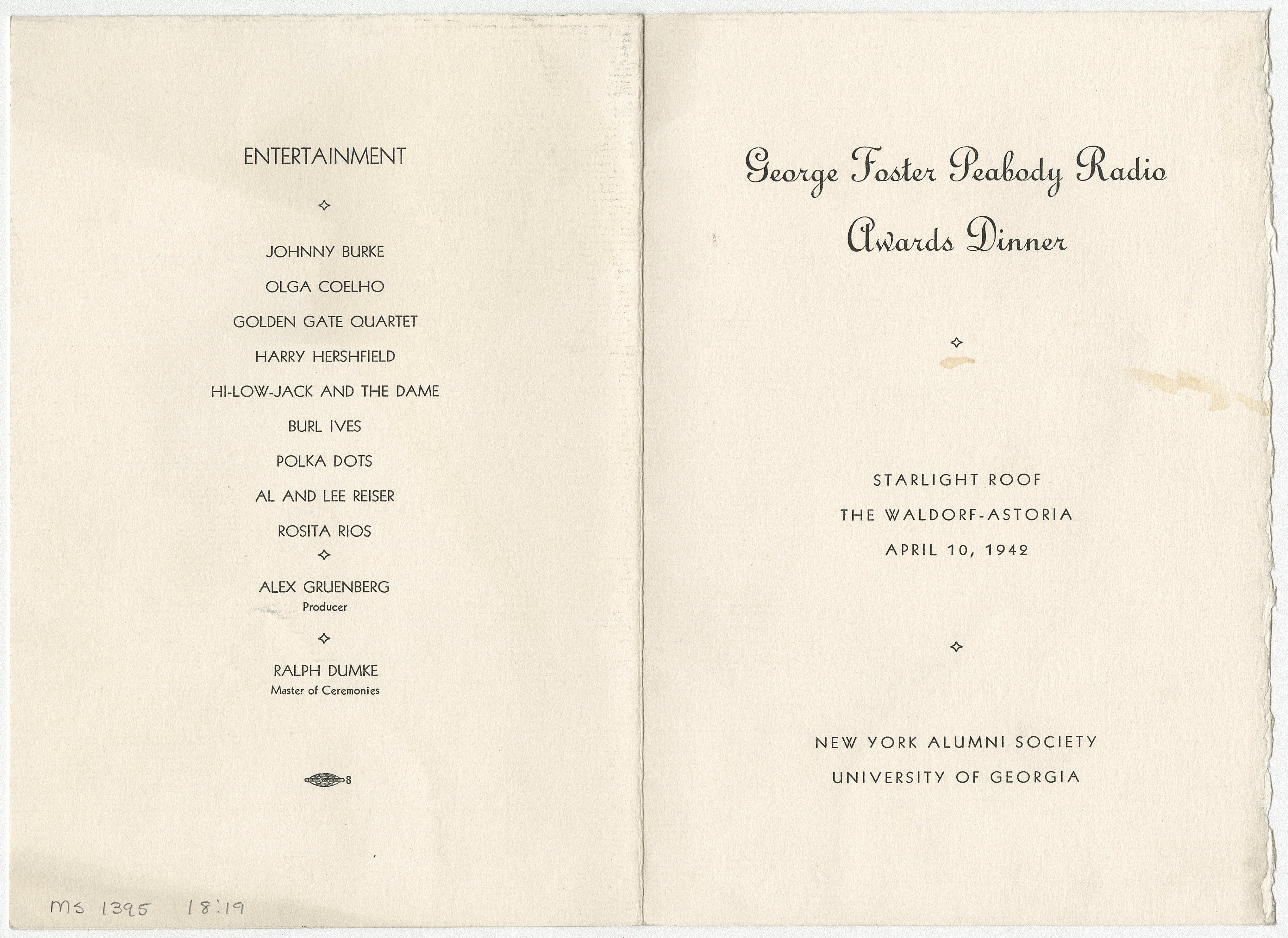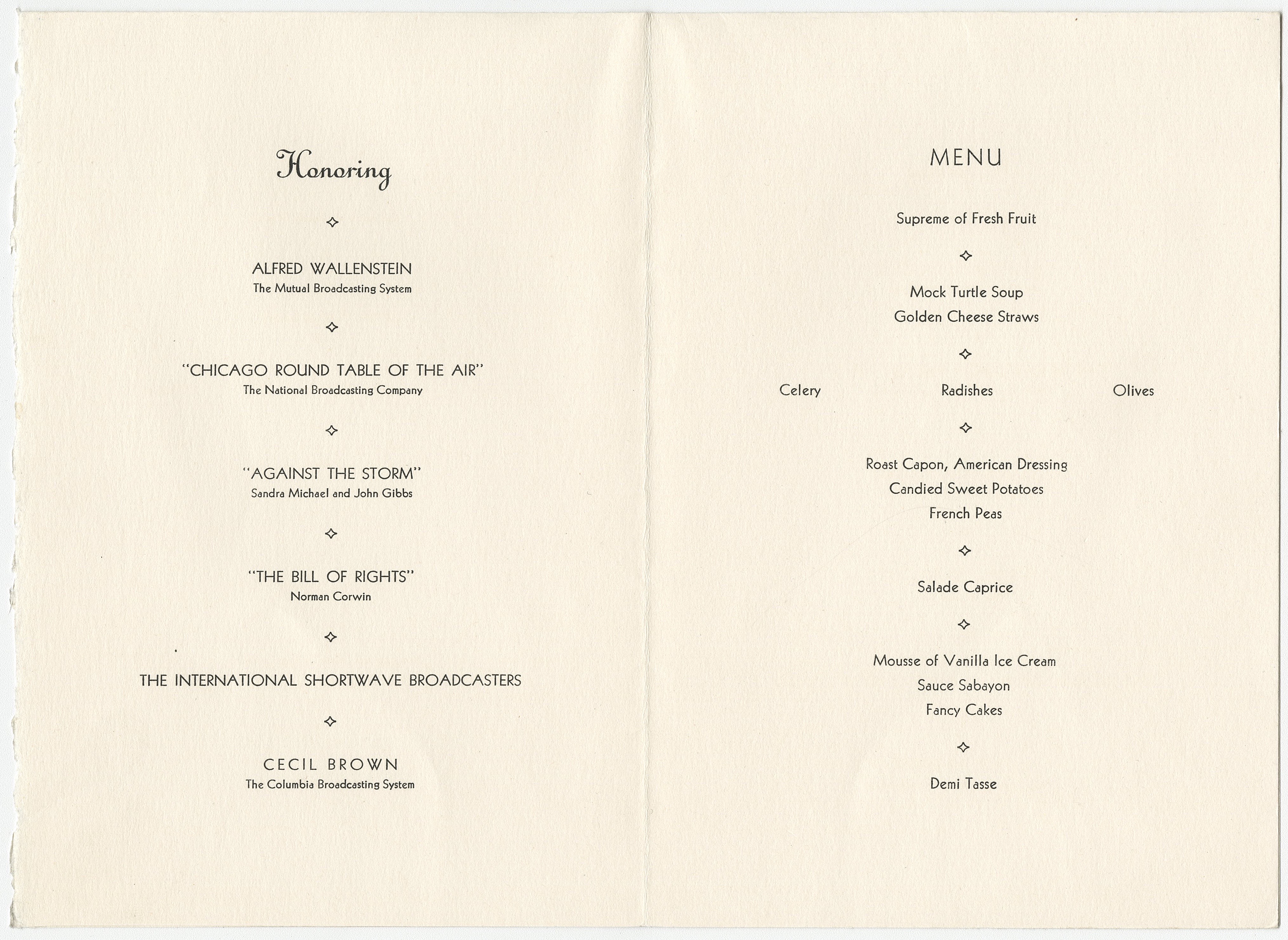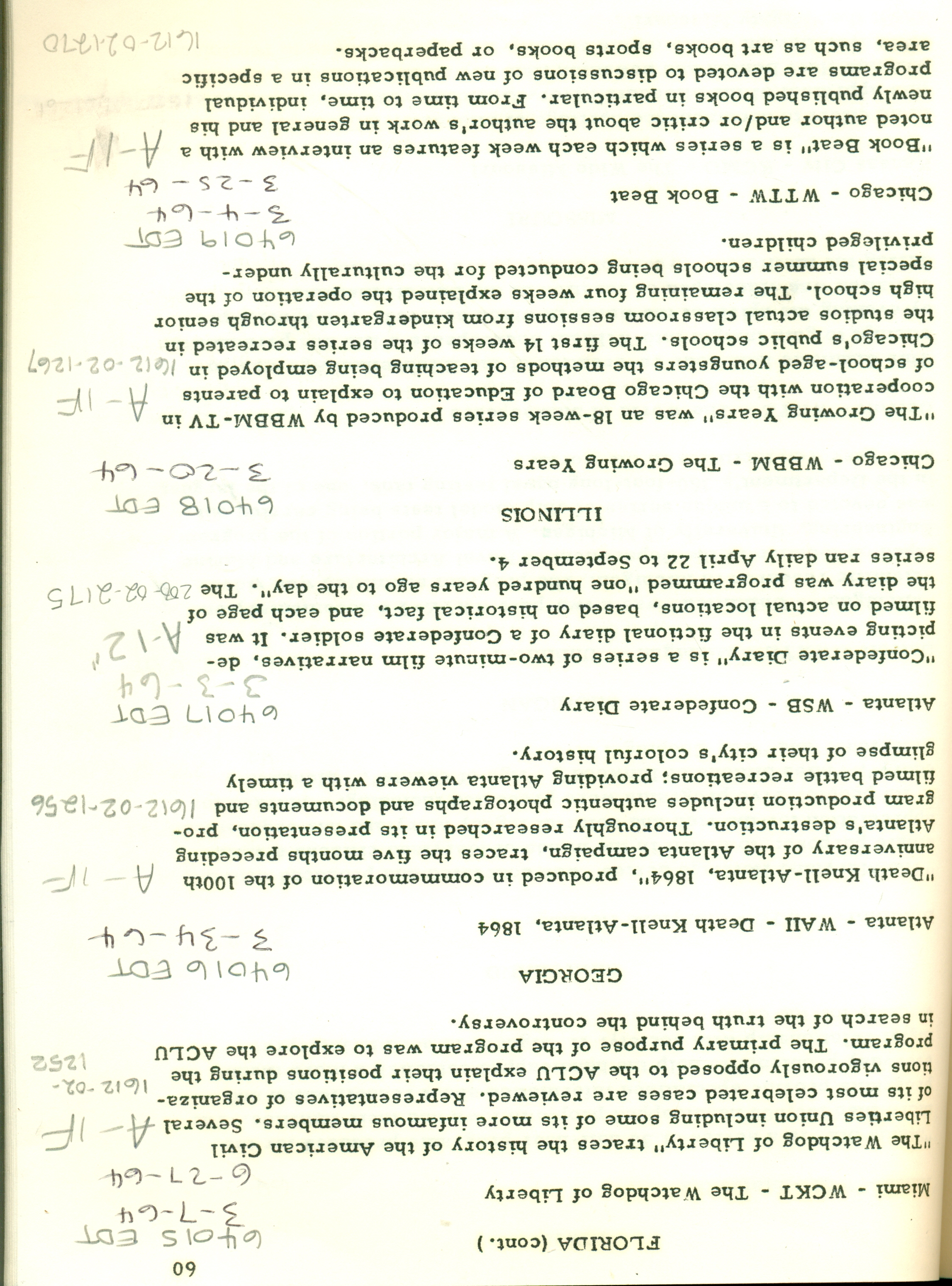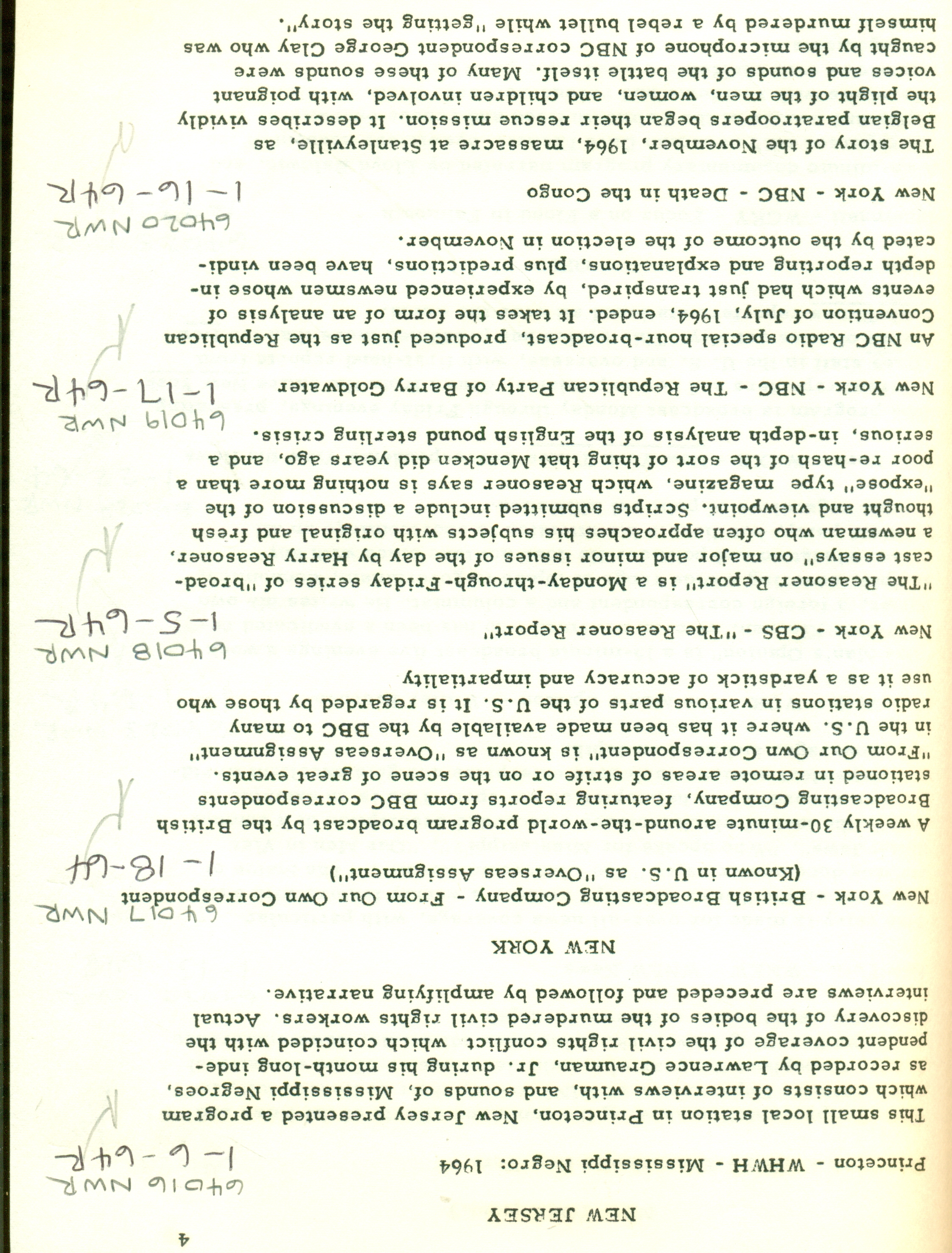Exploring Public Media in the Peabody Awards Collection
History of the Peabody Award
The George Foster Peabody Awards were created by the University of Georgia (UGA) in partnership with the National Association of Broadcasters (NAB). Founded in 1923, the NAB was instrumental in establishing the U.S. commercial radio system. In 1939, its awards chairman, Lambdin Kay, then general manager of WSB Radio in Atlanta, Georgia, was asked by the organization to create a prize to honor the nation's premier radio programs. Celestia "Lessie" Bailey Smithgall, a 1933 alumna of the University of Georgia, who was employed as copywriter at WSB, offered to introduce Kay to John Drewry, Dean of UGA's Grady School of Journalism. Together, Drewry and Kay developed the award, which they hoped would have the same prestige as the Pulitzer Prize for print journalism.
 |
The NAB favored the collaboration because they hoped that an association with an academic institution would help establish credibility for the award.
 |
Kay suggested naming the award for George Foster Peabody, a philanthropist who was a life trustee of the university.
In approving the award in May 1940, the Board of Regents of the University System of Georgia adopted a resolution to establish “a plan whereby the oldest chartered state university would recognize the youngest of the media of communication – and also honor a distinguished American.”
 |
A national advisory board administered jointly by the NAB and the University of Georgia's School of Journalism recommended award winners. The university system chancellor served as an ex-officio member of the advisory board along with “twelve other outstanding American citizens who have demonstrated in a notable degree their interest in public affairs, and who also by position and achievement are prepared to evaluate, in an impartial and detached manner, the contributions of radio stations and chains in connection with these awards.” 1
The Peabody Board, whose early membership included such notable figures as Kitty Carlisle Hart, Bennett Cerf, Newton Minow, and Alfred A. Knopf, met in New York to deliberate and select winners. In the early years of the Award, candidates in certain entries received honorable mentions. The Board discarded this approach by the 1950s, but it has returned after a fashion; in 2015, Peabody began to announce sixty finalists, of which thirty would be named as winners.
The first Peabody Awards ceremony was held at the Hotel Commodore in New York City on March 29, 1941. That 1941 ceremony recognized programs broadcast in 1940. The first winners were:
- KFRU: Public service by a small station
- WGAR: Public service by a medium station
- WLW: Public service by a large station
- CBS: Public service by a network
- Elmer Davis: Best news reporting
 |
In 1942, the Peabody Board instituted the practice of issuing citations for each winner that describe the merits of the winning programs and explicitly state the reasons behind the Board's decisions. The Board has used phrases like "excellence on its own terms" and "stories that matter" to summarize the Peabody ethos, but, according to Jeffrey P. Jones, Director of the Peabody Awards, "There has never been a fixed set of criteria for what constitutes a winning program." Nevertheless, winner citations make it clear that the Peabody Board has always rewarded "stories that contribute in some way to an engaged citizenship."2
In 1942, WHA in Madison, Wisconsin, became the first local public service radio station to win a Peabody Award for a specific series of broadcasts when Wisconsin School of the Air “Afield With Ranger Mac” won for Outstanding Educational Program. The winner citation noted, “This series sets an example which should be widely followed.”3
Listen to the first episode of “Afield with Ranger Mac” below:
 |
 |
In order to broaden the national scope of the Awards, in 1943 the Board established “listening posts” to advise board members of notable broadcasts in their areas. By 1944, more than 100 such posts had been established. Listening post volunteers were responsible for writing up recommendations of local programming they found worthy of commendation. To facilitate judging, the Peabody Awards Office prepared bound digests that contained basic entry information (title, station call letters, and location) and brief excerpts from the descriptions found on entry forms.
 |
 |
 |
 |
The 1945 Awards ceremony was broadcast by WNYC Radio, whose entry, Weekly Talk to the People: Mayor F. H. LaGuardia, was honored that year with an award.
Part 1
Part 2
In WNYC’s Peabody entry form, the station noted, “Mayor LaGuardia's Sunday reports to the citizens of New York City cover civic affairs, war developments, consumer information, and the multi topics that affect not only the lives of the City's seven and one-half millions but those of almost an additional four million more persons living just outside the metropolitan area. Informally discussing all aspects of the war and its relation to each individual New Yorker, the Mayor weekly reaches an audience unequaled by any other program on the air at that hour.” 4
The 1945 Awards ceremony included remarks by J. Harold Ryan, President of the National Association of Broadcasters; Paul Porter, Federal Communications Commission Chairman; and Dr. John Drewry of the University of Georgia. In accepting WNYC's award as a public service local radio station, Morris Novick thanked the Board for the "inspiration that this recognition will give to the many local radio stations throughout the country, and especially the thirty-odd non-commercial, publicly owned educational radio stations." A recording of the broadcast of the 1945 Awards ceremony is available courtesy of the WNYC archives at https://www.wnyc.org/story/peabody-awards-ceremony.
Although the Awards were created to honor public service radio programming, they broadened their reach as the medium grew. The Board added News, Educational, and Entertainment categories in 1942 and Programs for Children & Youth in 1944. The category Promotion of International Understanding, added in 1948, was discontinued after 1977. The "Special" category, covering programs that were not part of regularly scheduled series, existed from 1948 to 1972. Documentary, added in 1978, rapidly became the most heavily represented category, a status it currently maintains. The Board introduced a special Bicentennial category for 1976 only. Peabody has issued awards to Individuals and Organizations, with minor shifts in the definition of that category over time.
Peabody Awards entry forms instruct entrants to select a category for their entries. While submissions are organized by entry category for administrative purposes, for the majority of the program's history, the final awards have not been given based upon categories. The entire pool of submissions is considered, and the Board awards programs solely on merit without further classification. A winner is simply a winner, not a Documentary winner or a News winner.
The first television Peabody submissions came in 1948 in the form of the children's series Howdy Doody and the anthology series The Actors Studio. In presenting The Actors Studio with the first Peabody Award given to a television program, the Board noted it was "the first to recognize that drama on television is neither a stage play nor a movie, but a separate and distinct new art form."5 By 1952, the Board presented more television than radio awards. In 1951, the Board first recognized an international entry when it bestowed an Award on the BBC and Alistair Cooke for Letter from America. The Board gave its first Peabody Awards to cable shows in 1981.
In 1955, KQED became the first public television station to receive an honorable mention, and in 1957, WGBH became the first public television winner of a Peabody Award for Louis M. Lyons’ radio and television news reporting.
As all Eastern New England knows, Louis M. Lyons is a Yankee of sunny, salty character. His broadcasts, heard simultaneously on radio and television, are clear-headed, courageous but unbelligerent, forthright and fair. Aimed at the intelligent listener, they are an admirable example of what can and should be done in every vigilant community. For 1957, therefore, the Peabody Award for the best reporting and interpretation of the news from a local station goes to Louis M. Lyons of WGBH, Boston, Massachusetts.6
Below is an example of a Louis Lyons broadcast from 1957:
The first website to win a Peabody Award was Transom.org in 2003 for providing, according to the winner citation, “technical information and conceptual instruction for experienced radio producers, as well as those aspiring to present their own distinct perspectives and voices within a media mix too often defined by sameness and repetition…. [and] making a place for those who have little access to mainstream media to be heard.”7 Streaming and digital programming have won Peabody Awards since the 2010s. In 2015, Peabody established the Futures of Media Award, selected by the Peabody Student Honor Board, to recognize “groundbreaking digital narratives and the technologies used to tell these stories.”8
Peabody Leadership
John Drewry, the first Peabody Awards Director, held the position of Dean of the Henry W. Grady School of Journalism from 1940 until his retirement in 1969. Drewry's papers are archived at UGA and include many documents that trace the Award’s inception.
During the 1970s, director Worth MacDougald brought many administrative improvements to the Awards program. Peabody Board meetings expanded to three days and moved to UGA so that Board members would have more time to deliberate and could immediately access any programs they wanted to see or hear. During MacDougald’s tenure, an entry fee was added to cover administrative costs for the Peabody program; faculty and student screening committees were expanded; and standardized forms were implemented.
In the early 1990s, Barry Sherman, who succeeded MacDougald, initiated a fund-raising campaign that resulted in an endowment for the Peabody program. Sherman also arranged popular exhibitions of material from the Peabody archives at the Museum of Radio and Television in New York, the Louis Wolfson II Media History Center in Miami, the Museum of Broadcast Communications in Chicago, and the American Film Institute in Los Angeles. These activities helped to raise national awareness of the Awards.
After Lou Benjamin served as interim director during 2000, Horace Newcomb, director from 2001-2013, promoted scholarly use of the Peabody Awards Collection and instituted, with funding by Lessie Smithgall, a series of media-related lectures. The current Peabody Awards Director, Dr. Jeffrey Jones, is investigating ways to take advantage of emerging technologies to facilitate Board deliberations, share Peabody Awards Collection content with a wider audience, and attract new types of entries.
